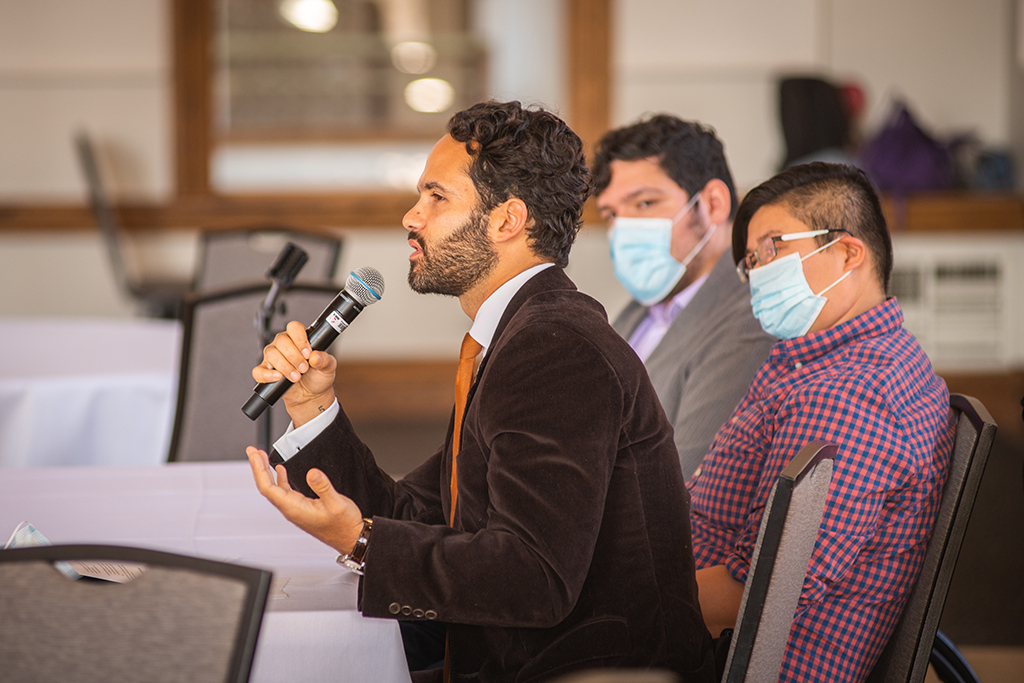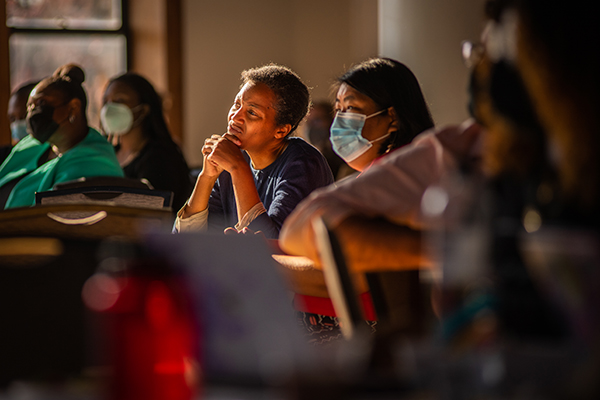‘We hope the Clark community sees this as a call to action’

Members of the Clark community gathered in Tilton Hall on the morning of Nov. 4 to help launch the Equity in Action initiative, which offered members of the Clark community “insights, tools, and strategies that will allow them to contribute to a more just and equitable Clark University.”
Equity in Action’s first all-day conference, “Advancing Anti-Racism Plans of Action on Campus,” was planned over the past year and executed by a group of students, staff, and faculty in response to demonstrated needs. The conference featured workshops, hands-on activities, and opportunities to build community around such topics as nurturing inclusive classrooms, supporting BIPOC students in the STEM areas, centering Latinx and BIPOC students in the classroom, supervising staff of color, promoting equitable outcomes for first-generation graduates of color, and celebrating the transformative powers of affinity spaces. As a purposeful part of the planning, student organizers were hired as employees while the panelists for each session received an honorarium.
The conference concluded with an address by Margo Foreman, vice president and chief officer of diversity, equity, and inclusion.
“This was an opportunity to invest time, resources, and energy to build Clark’s capacity to foster an anti-racist community,” said Hayley Haywood, assistant dean for equity in research and learning and a conference organizer. “To do so, we were intentional about weaving anti-racism throughout the planning process, design, and execution of the conference.
“The conference is only the beginning. We hope that all members of the Clark community will see this as a call to action to inform how they continually use their platforms to foster racial equity across campus.”
The day’s events began with sharing of personal narratives by Angel Guisado ’08, a human rights lawyer with the Center for Constitutional Rights; Peyton Wu, director for Identity Student Engagement and Access at Clark; and José Rosario, a Ph.D. candidate in psychology.
Guisado recalled his student days at Clark and the disparities he witnessed between those who came from wealth and privilege, and those like him who had few resources. When he injured his leg during a baseball game and required medical treatment, he had no health insurance. It took him six years to pay off the debt.
“I had to work twice as hard to prove I wasn’t just an affirmative action kid,” he said.
 In his remarks, Guisado challenged Clark to be more responsive to the needs of marginalized students by, among other things, giving them a more active role in institutional decision-making, investing more money in hiring faculty of color and various gender orientations, creating a student ombudsperson position, and retaining meaningful data on efforts to amplify diversity, equity, and inclusion on campus.
In his remarks, Guisado challenged Clark to be more responsive to the needs of marginalized students by, among other things, giving them a more active role in institutional decision-making, investing more money in hiring faculty of color and various gender orientations, creating a student ombudsperson position, and retaining meaningful data on efforts to amplify diversity, equity, and inclusion on campus.
Rosario noted the challenges he’s faced as a queer Latino man who uses a wheelchair, and how as a teenager he turned to activism to counteract the misperceptions about him and help open avenues of understanding and acceptance for all. “People don’t get to define your life unless you give them the power to do so,” he said. Rosario drew inspiration from his parents, natives of Puerto Rico who successfully battled the school district to get Jose his first wheelchair when he was in first grade.
He started a nonprofit, The Phoenix Empowered, to amplify people’s mental health narratives and to work on issues involving cultural trauma. Activism, Rosario told the students in the audience, is a way to find meaning in the world.
“You can share your voice, and not only if it aligns with the voice of the institution,” he said. “You have the power to influence another person’s life.”
Wu, who uses they/them pronouns, described the “journey with my voice” as ongoing. They felt silenced growing up, and even wrote in progressively smaller handwriting. “I learned to make myself invisible,” Wu said. Their voice “was something that was taken away from me that I had to find.”
Wu noted that it took time to develop their voice — to speak up, to contribute and express an opinion — and said mentors helped with that process. Wu referenced the need to establish a “village mentality” that “uplifts one another, but also uplifts the whole community,” and allows individuals to share their personal narratives.
“Sharing your story is an act of resistance,” they said. “Voice is not only about you; it’s also about your community.”


